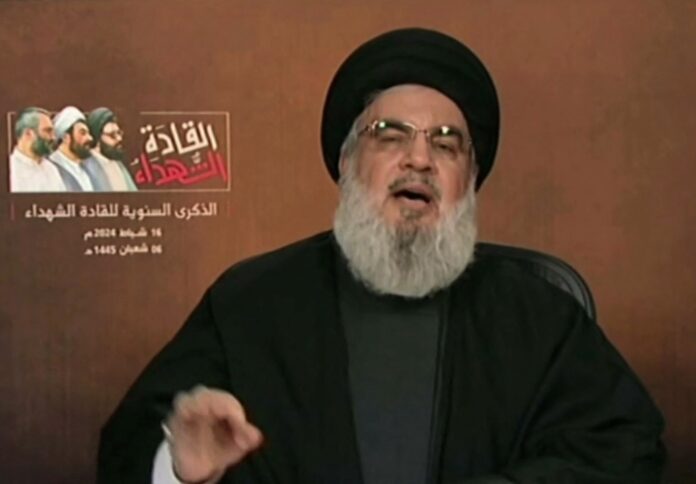Hezbollah’s leader Hassan Nasrallah has said that Israel will pay a price “in blood” for killing Lebanese civilians, signalling the conflict across the Lebanon-Israel border could intensify.
Israeli air raids on Wednesday killed at least 10 civilians, including five children, in southern Lebanon. Three Hezbollah fighters were also killed.
In a televised speech on Friday, Nasrallah said, “The response to the massacre should be continuing resistance work at the front and escalating resistance work at the front.”
“Our women and our children who were killed in these days, the enemy will pay the price of spilling their blood in blood,” Nasrallah said.
He also highlighted that the killings had increased Hezbollah’s determination and said the group would increase its “presence, strength, fire, anger” and expand its operations.
Israel “must expect that and wait for that”.
Shortly after Nasrallah’s speech, Hezbollah said it had targeted an Israeli army facility in Shebaa Farms, occupied territory that Lebanon regards as its own, with missiles, adding that casualties were inflicted.
‘Lebanon will also pay a heavy price’
Hezbollah has been trading fire with the Israeli military across Lebanon’s southern border in support of its Palestinian ally Hamas, which launched a cross-border assault from the Gaza Strip into Israel on October 7. This was followed by heavy Israeli bombardment of Gaza from the land, air and sea.
The cross-border attacks have killed at least 200 people in Lebanon, including more than 170 Hezbollah fighters, as well as 10 Israeli soldiers and five civilians.
Hezbollah officials have said they will stop attacking Israeli military posts when Israel’s assault on Gaza ends.
But there are growing fears of another full-blown conflict between Israel and Hezbollah with tens of thousands displaced on both sides of the border and regional tensions soaring.
The United Nations secretary-general’s spokesperson Stephane Dujarric has called for the violence to stop and countries like France have also delivered a written proposal to Beirut and Israel aimed at ending hostilities and settling the disputed Lebanon-Israel frontier. But there are few signs that those efforts will bear fruit in the immediate term.
On Friday, at the Munich Security Conference, where world leaders and security analysts have gathered to discuss solutions to solve global crises, Lebanon’s caretaker prime minister, Najib Mikati, urged calm and said attacks on civilians needed to end.
“Just two days ago, a family of seven innocent individuals was targeted in south Lebanon. The killing and targeting of innocent children, women, and older adults is a crime against humanity,” he said.
Israeli Foreign Minister Israel Katz told the conference that Hezbollah was just a proxy that Iran was manoeuvring as it saw fit and that Israel would not let instability in the north continue endlessly.
“If a diplomatic solution is not found, Israel will be forced to act in order to remove Hezbollah from the border and return our residents to their homes,” he said, referring to some 70,000 displaced Israelis.
“In such a case, Lebanon will also pay a heavy price,” he warned and called on world leaders to pressure Hezbollah and Iran to stop the attacks.
At a news conference in Beirut last week, Iran’s Foreign Minister Hossein Amir-abdollahian told reporters that Iran and Lebanon’s position was that “war is not a solution.”
However, he noted that amid Israel’s attacks on southern Lebanon, “Hezbollah and the resistance in Lebanon have courageously and wisely carried out their deterring and effective role.”
Amir-abdollahian added that Tehran will continue “its strong support to the resistance in Lebanon, as we consider Lebanon’s security as the security of Iran and the region”.



